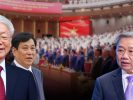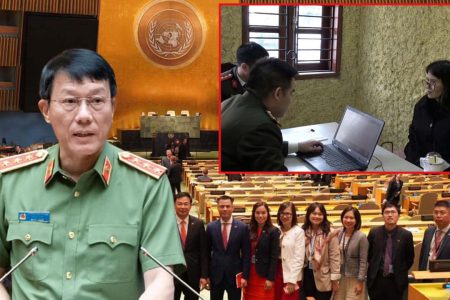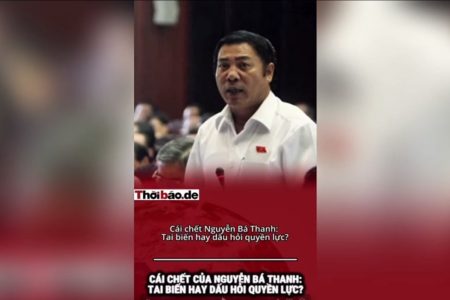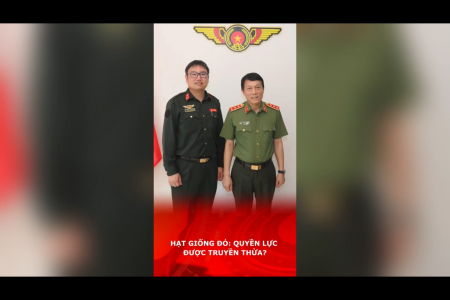
On May 8, there was a trial against Dang Thi Hue (aka Hue Nhu) and Bui Van Tien for objecting to the illegal fee collection of North Thang Long-Noi Bai BOT toll booth. The People’s Court of Soc Son district sentenced Hue Nhu to 42 months in prison (18 months and two years of probation in the past) and Bui Van Tien with 15 months in prison on charges of „causing public disorder.“
In the case file of Hue Nhu and Bui Tien, who are accused of causing disorder at North Thang Long – Noi Bai BOT, there is a document No. 269. That is Document No. 54 / CV-LNNC:

This text is from „Inter-district Internal Affairs of Soc Son District„, but it is not an agency. In the administrative system and political system of Vietnam, there is no agency or office named „Interdisciplinary Interior„.
Document No. 54 / CV-LNNC signed and sealed by the following 3 agencies:
– Soc Son District Court (Chief Justice Nguyen Mau Truong signed);
– Soc Son District People’s Procuracy (Deputy Director Hoang Van Long signed it);
– Soc Son District Police Investigation Police (Senior Lieutenant Colonel Nguyen Van Quyen, deputy head of the district police).
These three agencies are often referred to as the „three major internal branches.”

Thus, „Interdisciplinary Internal Affairs“ means „Three Internal Affairs“ including investigative police, procuracies, and courts. These are the bodies conducting legal proceedings, the institutions of justice.
The content of document No. 54 / CV-LNNC is recording the results of the meeting on October 14, 2019 of Soc Son district’s internal administration. Leaders of the three internal branches of Soc Son district held a meeting to discuss the „determination of the verdicts“ (indicated in the title of the document), and agreed on the Decision to select the case of Hue Nhu & Bui Tien as a case study. The case will be tried locally, „for propaganda against this kind of crime,“ that is to deter others. Quote:
“To propagate prevention for this kind of crime. On October 14, 2019, leaders of three internal branches of Soc Son district made a joint decision to bring the case to trial in the locality.
Three main internal branches of Soc Son district report to Hanoi city’s police, procuracy and court, and looking for their guidelines.” (See picture 3)
What is a „typical case” or „very important case„?
„Determination of typical case“ is to select a case to handle with strict punishment. This is the regular work of three main internal branches in provincial and district levels.
According to the Inter-ministerial Circular No. 01-TTLN of October 15, 1994, of the Ministry of the Interior (Now the Ministry of Public Security), the Supreme People’s Procuracy, and the Supreme People’s Court guide the settlement of key criminal cases; then „key cases are cases where the resolution of such cases is determined to be important, and the leaders of the three police branches, the Procuracy and the Court have the responsibility to uniformly direct and prioritize the use of using forces to investigate, prosecute and trial in the shortest time, ensuring strict, timely and accurate handling in order to serve local and national political duties.“
“The key case is not necessarily a serious crime case, but it is necessarily a case where its resolution is of certain importance. The determination of key cases must be based on the common political mission of the whole country stated in the Resolutions of the Party and the State and the local key tasks at the time of detecting crimes.“
„The resolution of key cases must meet high preventive requirements.“ (i.e. high deterrence)
Determining key cases is a regular task in localities
On October 16, 2019, just two days after the „interdisciplinary internal“ meeting, Hue Nhu was arrested and charged. During this meeting, the three main internal branches of Soc Son district decided to raise the case of Hue Nhu & Bui Tien to a „typical case,“ even though the investigation has not been completed but 3 months later. The investigation phase ends with the Survey Conclusion issued on Jan 14, 2020.
How is a „pocket judgment“ formed?
According to the Inter-ministerial Circular No. 01-TTLN dated October 15, 1994, once a case is selected as a „typical sentencing,“ representatives from the three branches must have close coordination from the outset until the case is completed, as well as in taking preventive measures.”
In particular, when preparing to bring the „typical case“ to trial, „The Procuracy and the Court should organize an exchange meeting in the spirit of Interdisciplinary Circular No. 01 / TTLN of December 8, 1988, of the Supreme People’s Court and the Supreme People’s Procuracy. Depending on necessary circumstances, representatives of investigating bodies may be invited to attend.”
Interdisciplinary Circular No. 01/TTLN dated December 8, 1988 calls this meeting „Preparatory Meeting“ before the trial of a complicated case: „Judges prepare to hear the cases and procurators will attend the live trial to talk to each other. In case of necessity, leaders of the two branches will discuss. Depending on each case, additional representatives of investigating agencies and assessors may be invited.”
The preparatory meeting is aimed at drawing a unanimous opinion about the case, often called a „pocket case.“ When conducting a trial, the Trial panel only pronounces the sentence as stated above, the presiding judge and the Trial panel who want to reduce the sentence, increase the sentence, or declare innocence for the accused do not dare to decide. It seems that the sentence was decided in the „Preparatory Meeting„.
It should also be emphasized that the „Preparatory Meeting“ between the court and the procuracy (including the investigating authority, if necessary) before the trial is a violation of the principle of independence of the court set forth in Article 103 The Constitution: “Judges and jurors are independent during the trials and obey only the law; Agencies, organizations, and individuals are strictly forbidden to interfere in the trials of judges and jurors.“ Article 23 of the Criminal Procedure Code also prohibits and punishes anyone who violates that principle.
How did the three main branches of the internal affairs of Soc Son district make a „case„?
Leaders of the three internal branches of Soc Son district chose Hue Nhu & Bui Tien cases as „case reports“ and „handling case“ locally „to propagandize and prevent this type of crime„, that is to threaten others and protect the illegal fee collection of North Thang Long – Noi Bai BOT toll booth, to protect the interests of the officials who are backing the facility, including Vo Nhat Thang, the owner of this dirty BOT facility.
Facebooker Nguyen Duc Nam, who attended similar trials, compared and judged the following:
“I have never been to a hearing that feels insecure like today. Not for the individual’s insecurity but for the community’s struggle against the North Thang Long – Noi Bai BOT facility.
Recalling last year, the first-instance and appellate trials of Ha Van Nam and Tran Dinh Sang were quite peaceful; the local authorities did not deploy too many policemen, there was no mobile speaker of police transmitting continuously and the trial period took place only in the morning.
However, the trial of Hue Nhu and Manh Tien on May 8 in the People’s Court of Soc Son district is different. Before the trial opened, many people were reminded by the police; dense police and standing guard stretched for kilometers, openly taking photos, filming, reminding, and pushing people who peacefully strive to observe the trial inside in the courtroom. Police cars carrying portable loudspeakers were deployed 2 hours before the start of the trial and maintained until the end of the trial. The trial period is too long compared to the people’s expectations, from 9 am to 5 pm even just try 2 individuals.
The question is why did Soc Son district police forces have to act like that? Due to the peculiar nature of the case of Hue Nhu – Manh Tien or the desire to threaten other anti-corruption activists who oppose the illegal fee collection of the BOT toll booths?
As the danger level of Hue Nhu – Manh Tien for BOT enterprises is inferior to that of Ha Van Nam – Tran Dinh Sang and the fact that their judgments are lower than that of Nam and Sang has proved that the tense atmosphere today has the sole purpose of threatening other anti-corruption activists and signaling that the government and the police will resolutely protect BOTs”
Hieu Ba Linh – Thoibao.de (Translated)


























